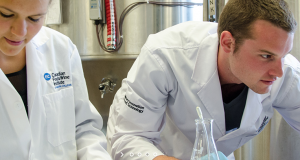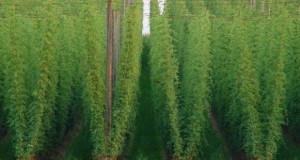Ontario breweries and wineries are getting on board with the organic movement. Projects like the 100-Mile Lager and Ale are bringing attention to the industry’s efforts towards sustainability.
By: Dan Beare | April 28, 2014 | In Food and Culture | Alternative Journal Canada’s Environmental Voice
AS THE SNOW (finally!) melts and warmer weather arrives many Canadians are looking forward to the opening of local patios so they can enjoy a refreshing beverage outdoors. Those beer and wine drinkers have seen a perceptible rise in local, sustainable, organic options in recent years. Much like the coffee industry, Canadian breweries and wineries are working to craft products that enhance sustainability and biodiversity, and have a reduced environmental footprint.
Green brewing
The demand for organic products throughout the food and beverage industry is being felt by North American brewers. In Agriculture and Agri-Food Canada’s profile of the brewing industry it suggests that brewers are “capitalizing on Canadian consumers’ growing desire for organic foods and beverages that are environmentally friendly…[extending] the organic food movement to beer which is marketed as a high-quality product produced in a way that encourages sustainable agriculture.” While comparable statistics for Canadian craft breweries cannot be readily found, American brewers have seen rapid growth: between 2003 and 2009 US organic beer sales more than quadrupled, from $9 million USD to $41 million USD.
Our organic beer industry has taken longer to gain a sizeable market share. The first certified organic lager in Canada appeared in 1997, brewed by Prince George, BC’s Pacific Western Brewing Company. Toronto-based Mill St Brewery offered Ontario’s first certified organic beer in 2002. Beau’s All Natural Brewing, located near Ottawa, has extended the certified organic mentality to all of its beers and recently became the first Canadian brewery to be officially certified as a Benefit Corporation for achieving high levels of environmental performance. While not organic certified, Toronto-based SteamWhistle Brewing has been officially recognized for its environmental initiatives promoting energy efficiency, waste reduction, and product stewardship. Lastly, in an unconventional approach, Saskatchewan-based Prairie Sun Brewery has made a beer with spruce and pine branches to raise funds for a local conservation authority. A list of some green breweries from across Canada can be found here.
Meanwhile, in a variation of the 100-Mile Diet, two Ontario brewmasters have collaborated to develop 100-Mile Lager and Ale, sourced with 100% Ontario ingredients. While not truly a 100-mile sourced product as ingredients are not limited to a specific radius but still locally sourced, it’s a step in the right direction. Traditionally, it was difficult for Ontario brewers to source their ingredients locally; for example one of the four primary ingredients in beer, hops, is often imported from Germany or Czech Republic. Now groups like the Ontario Hops Growers Association are promoting locally-grown hops and collaborating with interested brewers to create local supply chains.
Breweries are causing a ripple effect through their supply chains, thereby helping to support Canadian agriculture and avoiding the substantial GHG emissions generated by ocean-faring container ships. After launching an initiative with Bighead Hops, an organic hop grower from Meaford ON, Greenbelt Fund CEO Burkhard Mausberg was quoted saying “often times we focus on local food but we can’t forget local drink options too—and that includes craft brewers. This project proves we are making significant change in order to put more local drinks into Ontarians’ glasses.”
Biodynamic wine?
Since Hans Tammemagi wrote in A/J about the growth of sustainable wineries back in 2011 there has been a rise in biodynamic wineries. Terms like ‘natural’ or ‘sustainable’ wine have increased in popularity, but some including Mike Steinberger recently railed against the phrase, stating:
“natural” is a completely subjective designation… In contrast, say, to biodynamic wines, for which there are certification programs that require adherence to prescribed farming practices, there is no official classification for natural wines.
For similar reasons, ‘sustainable’ has been critiqued by some, including Bill Redelmeier, owner of Southbrook Vineyards in the Niagara Region. Southbrook Vineyards became the first biodynamic-certified winery in Canada and owner Redelmeier is a strong proponent of the philosophy. Biodynamics has been defined as “an approach to grape-growing seeing the vineyard as an ecological whole: not just rows of grapevines, but the soil beneath them—an organism in its own right—and the other flora and fauna in the area, growing together interdependently.” Wineries can be certified by Demeter, which has been established since 1927.
Beer or wine?
Although it depends on a multitude of factors such as materials sourcing, shipping, and packaging, in the end it is up to the consumer to reduce the environmental impact of their alcoholic beverages. In a simple comparison Treehugger writer Pablo Paster estimated that a bottle of wine has around four times the impact of a bottle of beer. In the end, one can only influence the markets by making green choices and buying local, organic certified products.
Use caution when buying!
Canadian breweries and wineries are exempt from the Canadian Food Inspection Agency’s Food and Drug Regulations concerning product labelling. Some craft brewers like SteamWhistle have opted to voluntarily provide all ingredients used on their packaging. There is vague terminology used by the industry as well, the most prominent being the phrase ‘all natural’ for discussing ingredients and/or processes. All natural is an essentially meaningless marketing term; instead, thirsty eco-savvy customers should look for an eco-label from a certification agency like EcoCert or Demeter International to be sure the product is genuine.
The Organic Products Regulations passed by Parliament in 2009 lays out the rules; only beers/wines with organic content that is greater than or equal to 95% can be labelled as organic and use the official organic logo on packaging.
To read the original article, please click here.
 Ontario Hop Growers' Association The OHGA is a not-for-profit association of hop growers, families and enthusiasts who are interested in supporting the growth of the hop industry in Ontario.
Ontario Hop Growers' Association The OHGA is a not-for-profit association of hop growers, families and enthusiasts who are interested in supporting the growth of the hop industry in Ontario.



